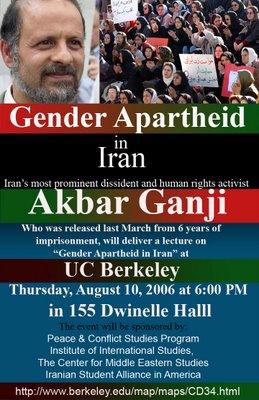Here is my latest piece on the letter of 9 Noble prize winners to the Iranian offcials supporting shirin Ebadi and her Human Rights organization.
BERKELEY, California, Aug 28 (IPS) - Nine Nobel Prize laureates have sent a letter to the Iranian government asking it to retract its threat to prosecute Iran's most prominent independent human rights organisation founded by Dr. Shirin Ebadi, winner of the 2003 Nobel Peace Prize.
On Aug. 2, Iran's
Ministry of Interior declared that Ebadi's Defenders of Human Rights Centre (DHRC) had failed to obtain a valid license and warned that the organisation would be prosecuted because its activities were "illegal." The DHRC has been a devoted and powerful voice for human and minority rights in Iran since its inception in 2001.




